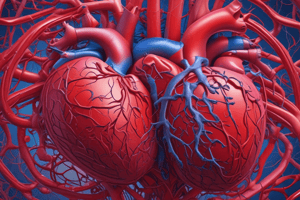Podcast
Questions and Answers
Where is the heart positioned in the body?
Where is the heart positioned in the body?
- Below the fifth intercostal space
- Behind the scapula
- One-third to the left of the body's midline (correct)
- Two-thirds to the right of the body's midline
Which type of blood vessels carry blood away from the heart?
Which type of blood vessels carry blood away from the heart?
- Capillaries
- Arteries (correct)
- Veins
- Venules
What is the function of pulmonary circulation?
What is the function of pulmonary circulation?
- Carries oxygenated blood from the left side of the heart to systemic cells
- Carries deoxygenated blood from the right side of the heart to the lungs (correct)
- Exchanges gases and nutrients in systemic cells
- Returns deoxygenated blood to the right side of the heart
Where do capillaries primarily facilitate exchange with tissues?
Where do capillaries primarily facilitate exchange with tissues?
What is located at the second rib level in the body?
What is located at the second rib level in the body?
Which structure is NOT part of the thoracic cage?
Which structure is NOT part of the thoracic cage?
Where is Erb's point located?
Where is Erb's point located?
What structures are included in the Superior Mediastinum?
What structures are included in the Superior Mediastinum?
Which division of the Inferior Mediastinum is located behind the pericardium?
Which division of the Inferior Mediastinum is located behind the pericardium?
Where do progenitor heart cells originate?
Where do progenitor heart cells originate?
Flashcards are hidden until you start studying
Study Notes
- The cardiovascular system is primarily responsible for transporting nutrients, hormones, oxygen, and removing waste products in the body.
- The heart, a muscular organ about the size of a fist, facilitates circulation by pumping blood through the body.
- The heart lies within the mediastinum, behind the sternum and between the second and sixth ribs, with two-thirds of its mass to the left and one-third to the right.
- The cardiovascular system consists of blood vessels, including arteries, capillaries, and veins, which form a closed network transporting blood.
- The heart's circulation occurs through four main routes: pulmonary circulation, systemic circulation, thoracic wall, and thoracic cage.
- Thoracic inlet, outlet, and sternal angle are essential anatomical landmarks in the region of the heart and lungs.
- The mediastinum is a partition between the right and left pleural sacs, housing various vital structures and surrounded by the thoracic cage.
- The mediastinum includes three divisions: superior, inferior, and posterior, each with distinct boundaries and contents.
- The heart forms through a process that begins with the specification of cardiac precursor cells in the epiblast, followed by tube formation from the cardiogenic region.
Studying That Suits You
Use AI to generate personalized quizzes and flashcards to suit your learning preferences.




